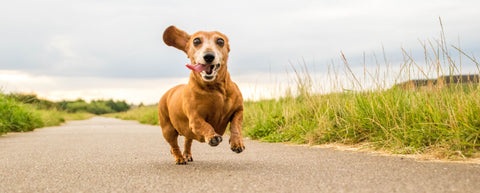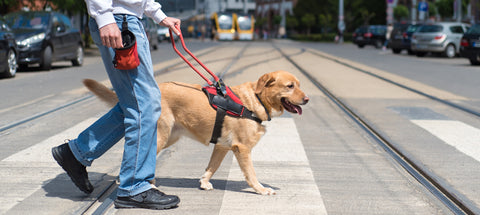If you’ve ever witnessed a dog with stiff joints, you’ll know how upsetting it can be – for you and for them. Watching your four-legged best friend have trouble getting up after rest, for instance, or lose their enthusiasm for their favorite pastimes, can be really hard.
Fortunately, there are steps you can take to help improve your canine’s mobility and stiffness. In this blog, we’ll break down the tell-tale signs of joint stiffness, and let you know how you can combat them – at any age.
What are the signs my dog needs joint aid?
Dogs are really good at hiding stiffness in their joints, so it’s important that, as owners, we recognise the signs ourselves. Keep an eye on how much your dog is sleeping – does it seem to be a lot more, all of a sudden? Are they lagging behind a little when it comes to the walkies they once loved, and is it proving a challenge to even get them out the door these days? You might also notice that your furry companion is avoiding the couch that was once they’re number one sleeping spot, or taking longer to climb the stairs. All of this kind of behavior would point towards joint stiffness.
Joint aid for dogs – our top tips
Regular exercise

Exercise is a huge contributor to healthy dog joints. The key? Making sure you’re doing it right. Walks should be matched to your dog breed’s particular needs, and be regular and short as opposed to long and sporadic. Also, it’s important to understand the kinds of exercise that could cause harm to the joints. For instance, ball throwers are largely frowned upon by veterinarians, because of the strain they put on the body when your dog comes to a grinding halt.
House-proofing for healthy joints
This is something we’d recommend from an early age. It’s simply a way of adapting your home to ensure your dog stays healthy as he or she gets older. Here are some pointers:
- Slippery floors can be hazardous to dogs with joint problems, so consider non-slip rugs where you’ve got tiled or wooden areas. Keeping those nails clipped will also help with this!
- Raised food bowls reduce the strain on the spine caused by bending, and help with swallowing and digestion.
- Stairgates or baby gates will stop your dog bounding up the stairs.
- Doggie ramps are great for the car or in place of a doorstep into the backyard.
Joint aid supplements
It’s a common misconception that joint supplements are just for older or senior dogs. In actual fact, these can be given at any age – to help with the healthy development of a pup or adolescent, or to support and maintain the joints of a dog as it grows older.
Our powerful YuMOVE joint supplements, containing scientifically proven ingredients, are designed to improve mobility and joint stiffness, and you’ll find bespoke products for your dog’s particular life stage.
As for what’s in them? There’s a whole load of miracle ingredients working together to do a whole lot of good. Our ActivEase® Green Lipped Mussel is in every tablet and capsule. It’s sourced from New Zealand and provides an incredibly concentrated source of Omega-3 fatty acids. Then there’s Glucosamine, which works wonders for dog’s cartilage, Manganese, which aids collagen formation, plus Hyaluronic Acid to cushion and lubricate the joints. Finally, there’s Vitamin C and Vitamin E to maintain joint mobility.
Find out more about the YuMOVE range.
Alternative therapies for dogs’ joint aid
Home methods aside, there’s a huge selection of alterative joint aid therapies you can try with your dog. Hydrotherapy is a really popular option – if you’ve never heard of it before, it’s the practice of improving your dog’s fitness and health in water. You can read more about it here.

Lots of dog owners may also visit a Canine Physiotherapist if their dog is struggling with joint stiffness. Sessions tend to involve special exercises to support and improve mobility, and you might be given homework to do each time. Take a look at some DIY exercises recommended by Canine Physiotherapist, Kathryn Hall, here.
Want more information about keeping your dog joint’s healthy for longer? Our FAQs page is a handy source of information. Alternatively, get in touch with our expert team at info@yumove.com or call 1-844-570-3222.












